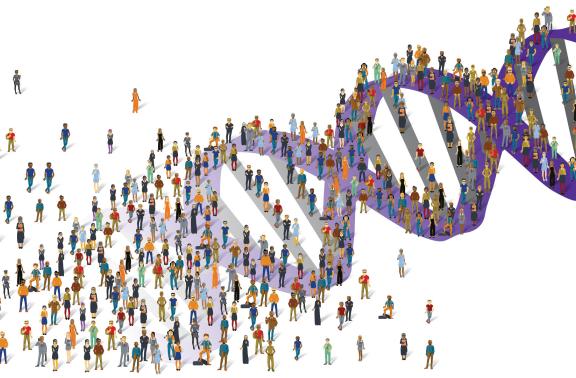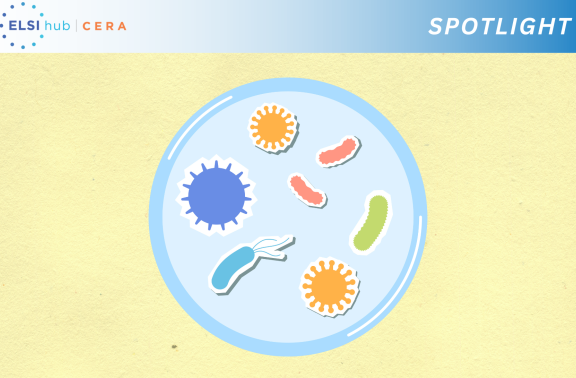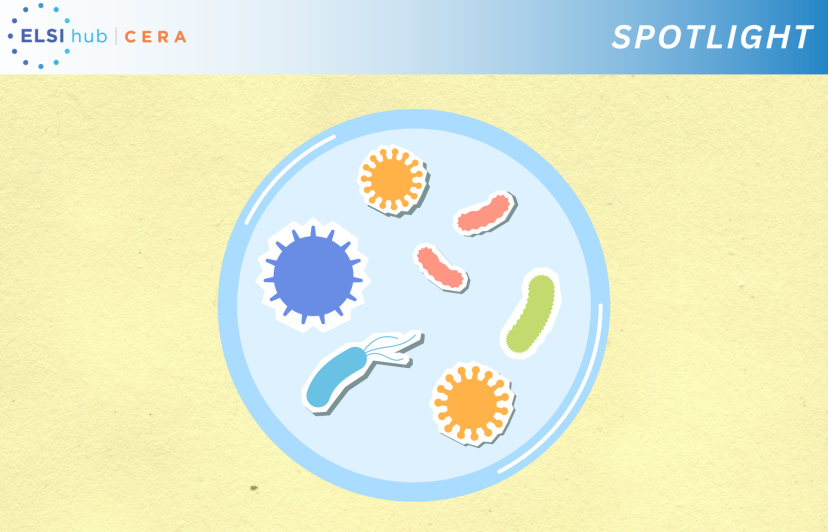
Promoting Access to “Microbial Wealth” with the Microbes and Social Equity Working Group
Our microbiome is important to our health and development. Its composition is determined by many factors including our diet, genetics, age, birth method, geographical location, exposure to environmental pollutants, and antibiotic use. Access to greenspaces and healthy diets and the beneficial microbiota they contain, or conversely, exposures to abiotic environmental hazards, can either enrich or deplete human microbial communities. Therefore, like access to other health promoting resources in society, access to opportunities to build “microbial wealth”, and attain its associated health benefits, can be socially patterned.
In recognition of this, the Microbes and Social Equity (MSE) Working Group, aims to enhance understanding of the interplay of microorganisms, individuals, societies, and ecosystems. The working group meets virtually and includes researchers, educators, practitioners, and policymakers from many disciplines and career levels across the globe. It seeks out opportunities for broadening education and training; diversifying microbiology research topics, methods, and perspectives; and advocating for evidence-based public policy. CERA spoke with four MSE members about the ethical, legal, and social issues associated with microbiome science and opportunities for ELSI researchers to get involved with this active group.
Contributors in alphabetical order:
 |
Amber Benezra, PhD, Assistant Professor Science and Technology Studies, Stevens Institute of Technology |
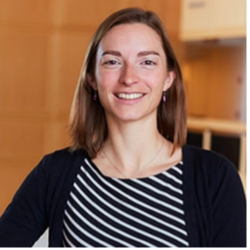 |
Erin Eggleston, PhD, Associate Professor of Biology, Middlebury College |
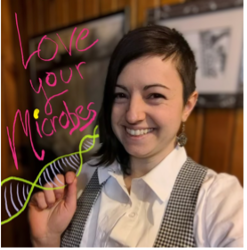 |
Sue Ishaq, Ph.D., Associate Professor of Microbiomes, School of Food and Agriculture, University of Maine |
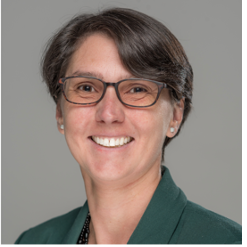 |
Katherine Weatherford Darling, Ph.D., Assistant Professor of Health Science, University of Maine School of Nursing, College of Earth, Life and Health Sciences |
CERA: What’s hot and new in the scientific study of the microbiome?
Sue: We learn new things about microbial communities (microbiomes) every day! Recently, many microbiome labs have focused on understanding the role of specific bacterial, fungal, or other species out of the dozens or hundreds you might find in a microbial community. There is also a great deal of interest in how microbes interact with specific bacteria. As one example of a recent line of discovery, we are learning about the chemical products that microbiota make, and how those chemicals might be used to feed or foil other members of the community.
CERA: Sue, you founded the Microbes and Social Equity Working Group, and Kate, you joined as an elected board member. Could you tell us a little bit about why this working group is important and what you consider its remit to be?
Sue: I formed this working group because so many researchers contacted me after my initial publication in PLOS Biology in 2019 asking for more community on this topic. Interdisciplinary research, by its nature, requires a large team of people, and many researchers felt obligated to represent all of microbiome research for their institution or professional unit, or felt that they were watching microbiome researchers make incorrect assumptions about the people they were studying because microbiome researchers often lack social science training. The group began as a way to foster peer-to-peer learning and discussion around how to integrate more social science education and training into microbiome research, and a way for people to meet other experts working on the same social issues from a different perspective. Over time, MSE grew into a platform to provide some education and training, as well as foster interdisciplinary research collaborations. Working together has helped us push the boundaries of what our respective research fields are limited by.
Kate: It’s been great to work with the MSE board and build some infrastructure and momentum around the discussions, connections and thinking that was sparking in 2020 within microbiology, along with other disciplines and professional fields. While many centers or working groups have been established on brick-and-mortar university campuses, MSE’s virtual and transnational approach to thinking together about science in careful and critical ways has been really exciting to see. With the formation of board structure, we’re hoping to create a more resilient network and become more proactive in carrying issues and questions forward—especially as a place to nurture and support early career researchers or others who may be facing challenges within their ‘local’ institutional settings.
CERA: What ethical, legal, or social issues do you see related to microbiome science?
Sue: Pretty much any ethical, legal, and social issues related to health can also be extended to the microbiome. Much of what our members focus on is data sovereignty and ownership rights over microbiome samples at biobanks, especially for Indigenous peoples who have frequently been studied without their full consent or participation in the research process. We also think about how to educate the public about these issues. We see issues regarding inequitable distribution of water, air, and soil pollution, as well as inequitable pollution-reduction infrastructure and mitigation efforts which neglect low-income areas of urban development (which was a topic of several presentations in our 2024 seminar series). Finally, we also see a lot of issues of overt racism being propagated through microbiome research. For example, when microbiomes are organized in ways intended to mirror the social hierarchy in our society, which perpetuates the racist idea of biological determinism. Several MSE members are currently putting together a literature review on this issue, but many other researchers have spoken out about the inappropriate racialization of the microbiome previously.
Amber: I’m a sociocultural anthropologist, and I’ve worked for the last 15 years on the social and ethical side of the microbiome. Microbial populations (especially those in human bodies) are necessarily bio-social–meaning our microbiomes are made through our genetic and biological environments, but also through things like where on Earth we live, what food we eat, and who we share a bathroom with on a daily basis. The social circumstances of our lives are indivisible from what microbes we have, and what microbes we have hugely impact our states of health and illness. One socio-ethical challenge in microbiome science is, as Sue said, to explore how structural inequities impact microbiomes: from things like access to health care and food to toxic exposures. Another challenge is to interrogate the ways in which microbiome science itself is done. Because microbiome science is so new, we have the chance to intervene and stop it from replicating historical systems of discrimination, like using race as a biological category, or seeking to explain health disparities through microbial populations instead of the actual socio-environmental causes.
Kate: When the Human Microbiome Project (HMP) launched at the U.S. National Institutes of Health, there were a few ELSI projects included within the larger umbrella of HMP, including a project I was fortunate enough to be a part of at Stanford. It has been interesting to reflect on what has changed within the field since the early aughts. In analyzing reflective workshops conducted with microbiome scientists, we observed that the diverse interdisciplinary nature of microbiome science really facilitated and necessitated scientists to take a more critical and questioning stance when it came to taken-for-granted categories like ‘health’ and ‘disease’. That interdisciplinarity seems to have just expanded exponentially, and it’s been exciting to microbiome scientists and a bunch of microbiologists committed to thinking so carefully about what they do and how they do it. In some ways, it’s not surprising to see microbiome scientists work so reflexively. And where we are now, as an ELSI community, really mirrors the emergent nature of microbiome science as a field. Within ELSI research, a core challenge still seems to be how exactly we go about integrating reflection, equity and everyday scientific practices. What’s most exciting to me about MSE, is the network is really breaking some of those siloes because we now take for granted that science and society are so completely entangled with each other.
CERA: What are some accomplishments of the MSE Working Group so far?
Sue: Several journal publications have been written by various group members, including the 2019 paper introducing the concept, the 2021 paper debuting the group, as well as several invited papers that have been published in a special collection at the mSystems journal to highlight this research topic. We’ve run an annual virtual speaker series, and a nearly-annual virtual symposium, since 2021, which attract several hundred attendees each year, and even led to a paper describing how we designed our symposia. We’ve been able to host special sessions at some national scientific conferences. The group itself has grown to about 300 members, with several hundred social media followers.
Erin: Chiming in here to add that we also are building a Global Classroom Curriculum network with the goal of creating, sharing, and networking with educators who want to engage with social and ethical issues in microbiome science at the levels of K-12, undergraduate, postgraduate, or community-facing learning communities.
CERA: Are there ways that members of the ELSI scholarly community can get involved with the working group?
Sue: MSE is free to join, and we welcome researchers, practitioners, students, and the public to join the group and participate in our activities or simply join our mailing list to hear about what we are up to. Anyone can get involved or check out what we are up to by visiting our “get involved” page of the MSE website. Attending our seminars and symposia, as well as being active in our social media spaces, is a great way for people to become more familiar with other members in the community, as well as begin networking to get involved in research or education activities.
Erin: We plan to build our Global Classroom Curriculum in a space that would be accessible to any scholar/teacher/educators that might be interested from the ELSI community.
Kate: With so many dynamics of U.S. science and education policy in flux, the MSE Summit planned for this summer is pivoting to a virtual event, with registration opening soon. One portion will be webinar-style presentations which are open to the public, and which showcase current research and education activities related to the ties between microbiomes and health. The other portion will feature small-group activities and discussions on systems-level research designs, as well as stimulate collaboration on case studies around the concept of microbiome stewardship. This portion will be open to registrations who demonstrate that their work would benefit from attending, and anyone is welcome to apply to attend. We hope the summit will provide a space for members to build and strengthen networks of solidarity across disciplines and continents in this virtual space.
CERA: Those interested can register for your 2025 speaker series (or check out your video archive). What sessions within the 2025 lineup would you highlight for the ELSI community?
Kate: We have several great upcoming speakers for spring and summer. In March, Dr. Romero-Olivares will join to discuss climate change and its impacts on microbial ecology and evolution. In April, Dr. Geovanni Santiago will be sharing work on microbial ecophysiology and the role of archaea in animal and plant microbiomes, and In May, Dr. Meisner will give a talk. Her work has examined systems approaches to microbiome research and microbiome ethics. MSE members are fabulous interlocutors and listeners, and the discussions are often lively, leading to surprising connections and questions. We hope you will join us.
Explore the ethical, legal, and social implications of human microbiome science on ELSIhub.org.

